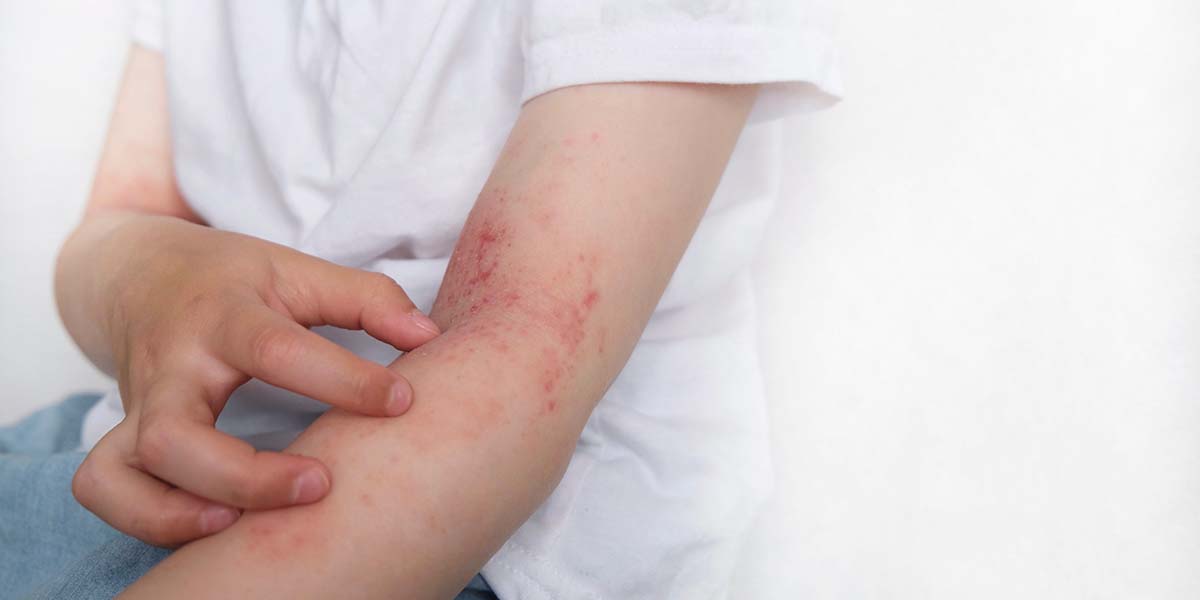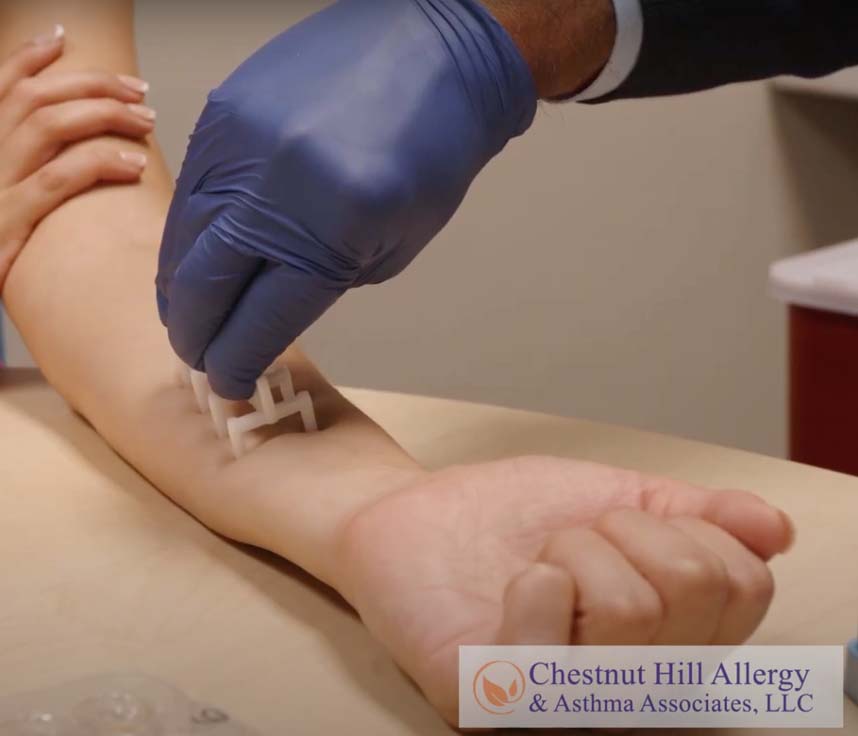For many families across Philadelphia, Bucks County, and Montgomery County, Halloween is filled with excitement,…

Eczema and Allergy Testing
Eczema is a frustrating and at times debilitating condition, with a severe itch that can prevent sleep and ability to perform daily tasks, and when not well controlled it can lead to infection and chronic changes to the skin.
Although it is usually not possible to completely cure eczema, as it is a condition that waxes and wanes, there are many things we can do to improve it and decrease frequency and severity of flares.
It is natural to want to get to the bottom of what may be “causing” your eczema, however there is usually not one specific trigger.
Common triggers that can worsen eczema include:
- Scented products on the skin and in the home, such as lotions, soaps, perfumes, detergents, fabric softener, and air fresheners, as well as scented candles, diffusers and incense
- Certain fabrics, 100% cotton tends to be the best type of fabric for people with eczema.
- Heat for some, cold for others
- Sweat
- Stress
- Environmental allergens
Is eczema a sign you are allergic to something?
- Eczema is usually the first symptoms of the “atopic march”, a term used to describe a constellation of having or developing eczema, food allergy, environmental allergy, and/or asthma.
- Although eczema is an allergic condition, it does not always occur in conjunction with other allergic diseases as above.
- Eczema is a problem with the skin barrier.
- Having a broken skin barrier introduces your body to allergens through the skin instead of the nose, lungs, and gut, which can predispose or increase your risk of developing nasal allergies, respiratory allergies, and/or food allergies.
- In regard to food allergy, eczema can put one at risk for developing a food allergy but is generally not caused by a food allergy.
Will allergy testing help me avoid things that may be triggering my eczema?
 As noted above, most eczema triggers are not allergens.
As noted above, most eczema triggers are not allergens.- However, sometimes environmental allergies can trigger eczema, especially indoor allergens such as dust mite or pet dander.
- Identifying environmental allergies and decreasing your exposure to these allergens can improve your eczema, however it will not completely resolve it.
Can we test for food allergies just to be sure?
- It is not recommended to test people, especially babies and toddlers, for food allergies unless they have a history of an immediate allergic reaction to a food.
- An immediate allergic reaction is characterized by hives, swelling, vomiting, trouble breathing, or other severe/anaphylactic symptoms that occur within 30-120 minutes after eating a certain food.
- These symptoms resolve after a few to several hours, and do not continue to occur for days after exposure.
- Skin prick testing to foods is only validated to diagnose immediate life-threatening type food allergies, as noted above. It unfortunately does not give us information on sensitivities or intolerances.
- Skin prick testing to foods can result in false positives. If a false positive occurs and foods are removed from the diet, especially in babies and toddlers, an immediate life-threatening allergy can develop in that patient, and this anaphylactic allergy can persist for life.
- The risk of developing a life-threatening allergy by removing a food that was previously tolerated is higher in those with eczema (as they are, in general, at higher risk for developing food allergies, as mentioned above).
Is there ever a good reason to skin test for food allergies?
- Yes! If there is a history of an immediate allergic reaction to a food, as characterized by hives, swelling, vomiting, trouble breathing, or other severe symptoms that occur within 30-120 minutes after eating a certain food.
- Maybe! If you notice that eczema flares within 30-120 minutes after eating a certain food, gets better later in the day, and flares again when eating that food again.
What is the best way to treat eczema?
- Consistently following a skin care regimen with gentle, unscented, products is the best first step in managing eczema.
- This includes frequently moisturizing with a thick, unscented cream.
- A few of our favorite skin care brands include Cetaphil, CeraVe, and Vanicream, although there are many other great products out there!
- The doctors at Chestnut Hill Allergy & Asthma Associates can help create an individualized skin care plan for you or your child based on your eczema severity, daily routine, and current environmental exposures.
- Topical steroids can be helpful in controlling flares but should be used sparingly to avoid side effects from long-term topical steroid use.
- Topical non-steroidal creams are available as well to be used daily for maintenance, or as needed for flares.
- Injectable medications are now available for the treatment of severe, difficult to control, eczema. These medications block specific allergy pathways in your body to decrease allergic inflammation in your skin and other areas of the body. These medications do not cause immune suppression.



